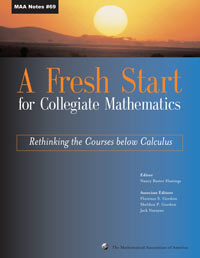- About MAA
- Membership
- MAA Publications
- Periodicals
- Blogs
- MAA Book Series
- MAA Press (an imprint of the AMS)
- MAA Notes
- MAA Reviews
- Mathematical Communication
- Information for Libraries
- Author Resources
- Advertise with MAA
- Meetings
- Competitions
- Programs
- Communities
- MAA Sections
- SIGMAA
- MAA Connect
- Students
- MAA Awards
- Awards Booklets
- Writing Awards
- Teaching Awards
- Service Awards
- Research Awards
- Lecture Awards
- Putnam Competition Individual and Team Winners
- D. E. Shaw Group AMC 8 Awards & Certificates
- Maryam Mirzakhani AMC 10 A Awards & Certificates
- Two Sigma AMC 10 B Awards & Certificates
- Jane Street AMC 12 A Awards & Certificates
- Akamai AMC 12 B Awards & Certificates
- High School Teachers
- News
You are here
A Fresh Start for Collegiate Mathematics: Rethinking the Courses below Calculus

Nancy Baxter Hastings, Editor
Florence S. Gordon, Sheldon P. Gordon, and Jack Narayan, Associate Editors
Catalog Code: NTE-69
Print ISBN: 978-0-88385-179-1
Electronic ISBN: 978-1-61444-302-5
400 pp., Paperbound, 2006
List Price: $51.50
MAA Member: $41.50
Series: MAA Notes
To order a print book, call the MAA Service Center at (800) 331-1622.
Each year, over 1,000,000 students take college-level courses below calculus such as precalculus, college algebra and others that fulfill general education requirements. Most college algebra courses, and certainly all precalculus courses, were originally intended to prepare students for calculus. Most are still offered in this spirit, even though only a small percentage of students have any intention of taking calculus. This volume examines how the courses below calculus might be refocused to provide better mathematical experiences for all students. This initiative involves a greater emphasis on conceptual understanding while de-emphasizing rote manipulation. It encourages the use of realistic applications, math modeling and data analysis that reflect the ways mathematics is used in other disciplines. It promotes the use of active learning approaches, including group work, exploratory activities and projects. It emphasizes communication skills: reading, writing, presenting and listening. It endorses the appropriate use of technology to enhance conceptual understanding and visualization and to enable students to tackle real-world problems.
The 49 papers in this volume seek to focus attention on the problems and needs of the courses below calculus and to provide guidance to the mathematics community. Major themes include: new visions for introductory collegiate mathematics, transitions from high school to college, needs of other disciplines, research on student learning, implementation issues, and ideas and projects that work.
Table of Contents
Preface
Introduction
Background
Theme 1. New Visions for Introductory Collegiate Mathematics
Theme 2. The Transition from High School to College
Theme 3. The Needs of Other Disciplines
Theme 4. Student Learning and Research
Theme 5. Implementation
Theme 6. Influencing the Mathematics Community
Ideas and Projects that Work: Part 1
Ideas and Projects that Work: Part 2
Excerpt: Introduction (p. 1)
The calculus renewal effort continues to have a significant impact on undergraduate mathematics education. Today, most new editions of calculus texts, even so-called traditional ones, incorporate significant themes and problems developed as part of the calculus reform movement. On the other hand, the mathematics community has paid little attention to the courses that precede calculus, most notably precalculus and college algebra. Moreover, only a small percentage of students who take precalculus ever go on to take calculus and many who do are not well prepared and never complete the next course. In response to these concerns, the conference, Rethinking the Preparation For Calculus, was held in October, 2001. Since the papers presented at the conference form the basis for this volume, the volume begins with an overview of the conference co-authored by Jack Narayan, the principle organizer of the conference, and with the text of the keynote speaker address given by Lynn Steen. The twenty questions about precalculus that Lynn posed guided many of the discussions at the conference. As you read about the conference in the initial papers in this section and in the papers that follow, please keep in mind that the focus of the conference was on precalculus courses that are not terminal—that is, on courses that prepare students to take calculus. During the conference it became apparent that this focus was too narrow and consequently the focus of this volume was extended to include the courses below calculus. Also please keep in mind that four years have passed between the conference and publication of the volume.
Tags:
Book Series:




